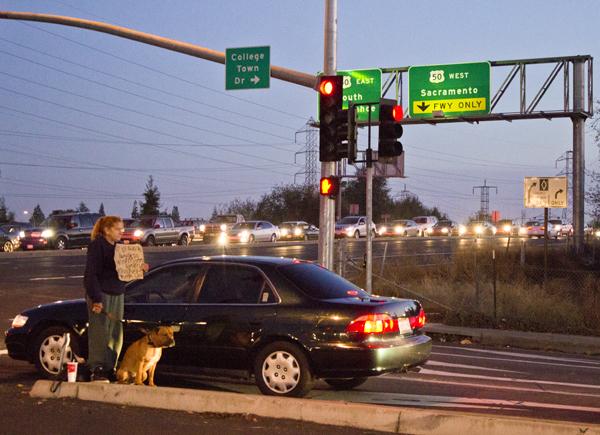Homeless dismissed by society a tragedy

A homeless woman asks for money from people driving near campus, standing in the cold with her dog.
November 30, 2011
The homeless have become commonplace in society. We see them at gas stations, restaurants and busy intersections.
However, because they are a common sight, people become desensitized to their need.
Society often stigmatizes the homeless, and seeks to separate itself from the sordid reality of poverty and hardship.
Yet the only difference existing between those who have a place to live and those less fortunate are life situations that can change at any time.
Anyone could suddenly end up without a job and a place to live. This is likely to happen more during the current economic crisis.
The U. S. Census Bureau’s American Community survey estimates that from 2008 through 2011 approximately 15.3 percent of people in Sacramento County will be below poverty level.
People should try to empathize with the indigent, not judge or outright ignore them.
Recently, a friend and I were running errands and we stopped at a light. There was a homeless man panhandling on an island and the sight of him was uncomfortable, so I made a futile effort to ignore him.
He kept his distance but tried to get our attention by making eye contact. He eventually shamed me into acknowledging him and I handed him a crumpled dollar bill. He took it from me with a smile, said “Thank you” and moved on to the next car.
This ordinary encounter made me realize the man to whom I had just handed a dollar was a person just like me. He, too, experienced being cold, hungry, tired and probably felt as uncomfortable as I did when he asked me for money.
Ethnic studies professor Fundi Kiburi had an experience with homelessness earlier in his life when he and his family lived in the Bay Area.
“We were homeless for about a week and a half … I fell out with some people my wife and I were in a cooperative housing venture with and so we left,” Kiburi said. “Didn’t have any place to go to, all we had was the use of a car, a couple hundred dollars and three children.”
Luckily, his experience was short-lived as he and his family soon found a place to live and he happened upon a job. Although they were no longer homeless, Kiburi and his family still experienced financial need. Kiburi admitted during this time he stole food from supermarkets in order to feed his family.
“I engaged in some thievery to survive to feed my family and myself,” Kiburi said. “I’m not proud of it, but my attitude is if you and the people you’re responsible (for) are hungry and you’ve exhausted all avenues of legitimate methodologies to acquire food, then what is left for you to do but steal it.”
Kiburi also said with all the wealth in our country there is no reason homelessness should exist and emphasizes that poverty can happen to anyone.
Not enough people think about poverty. Instead people shy away from its grime, considering themselves too clean to soil their conscience by acknowledging its existence.
Undeclared sophomore Nancy Phu said she considers homelessness a problem but is sometimes reluctant to help because she is unsure whether the need of some is real.
“I do want to help but sometimes I am intimidated by the way some homeless act,” Phu said. “Sometimes I wonder if they need help or if it’s just a con.”
Still, Phu said she would be interested in volunteering to help the homeless in the future.
Indifference is the wrong attitude to have toward homelessness. We cannot insult fellow human beings by pretending their needs and suffering don’t exist.
Homelessness is a problem deserving of more effort than grudgingly digging in our pockets for loose change. We should seek to become involved in helping the homeless.
Good places to start are charity organizations. Soup kitchens and missions are always in need of donations and volunteers.
Poverty in our communities is a reality we can no longer afford to ignore. It is time to stop looking the other way and confront it head-on.
Catalina Carapia-Aguillon can be reached at [email protected]








































































































































